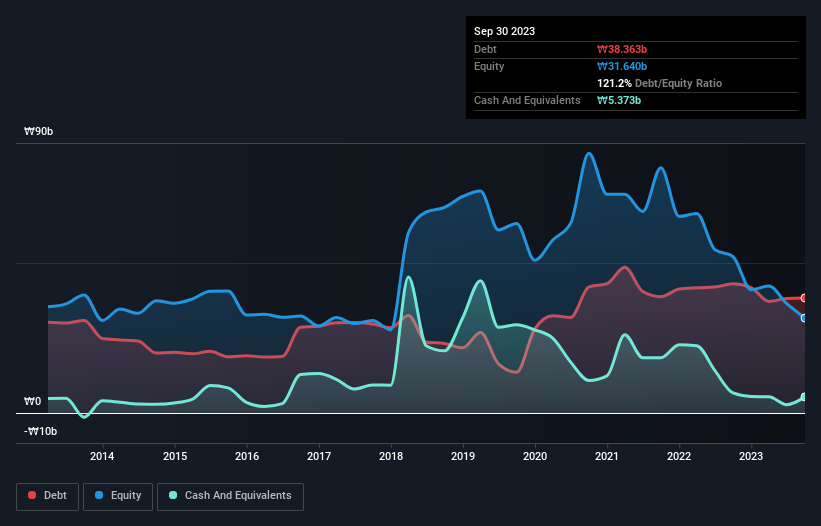
David Iben put it well when he said, 'Volatility is not a risk we care about. What we care about is avoiding the permanent loss of capital.' It's only natural to consider a company's balance sheet when you examine how risky it is, since debt is often involved when a business collapses. We can see that BL Pharmtech Corp. (KOSDAQ:065170) does use debt in its business. But should shareholders be worried about its use of debt?
What Risk Does Debt Bring?
Generally speaking, debt only becomes a real problem when a company can't easily pay it off, either by raising capital or with its own cash flow. If things get really bad, the lenders can take control of the business. However, a more common (but still painful) scenario is that it has to raise new equity capital at a low price, thus permanently diluting shareholders. Of course, plenty of companies use debt to fund growth, without any negative consequences. When we examine debt levels, we first consider both cash and debt levels, together.
See our latest analysis for BL Pharmtech
What Is BL Pharmtech's Debt?
As you can see below, BL Pharmtech had ₩38.4b of debt at September 2023, down from ₩43.0b a year prior. However, it also had ₩5.37b in cash, and so its net debt is ₩33.0b.

A Look At BL Pharmtech's Liabilities
We can see from the most recent balance sheet that BL Pharmtech had liabilities of ₩44.2b falling due within a year, and liabilities of ₩16.6b due beyond that. Offsetting these obligations, it had cash of ₩5.37b as well as receivables valued at ₩13.8b due within 12 months. So its liabilities total ₩41.6b more than the combination of its cash and short-term receivables.
When you consider that this deficiency exceeds the company's ₩32.6b market capitalization, you might well be inclined to review the balance sheet intently. In the scenario where the company had to clean up its balance sheet quickly, it seems likely shareholders would suffer extensive dilution. When analysing debt levels, the balance sheet is the obvious place to start. But it is BL Pharmtech's earnings that will influence how the balance sheet holds up in the future. So when considering debt, it's definitely worth looking at the earnings trend. Click here for an interactive snapshot.
Over 12 months, BL Pharmtech reported revenue of ₩97b, which is a gain of 12%, although it did not report any earnings before interest and tax. We usually like to see faster growth from unprofitable companies, but each to their own.
Caveat Emptor
Importantly, BL Pharmtech had an earnings before interest and tax (EBIT) loss over the last year. Its EBIT loss was a whopping ₩5.8b. When we look at that alongside the significant liabilities, we're not particularly confident about the company. It would need to improve its operations quickly for us to be interested in it. For example, we would not want to see a repeat of last year's loss of ₩16b. And until that time we think this is a risky stock. There's no doubt that we learn most about debt from the balance sheet. But ultimately, every company can contain risks that exist outside of the balance sheet. To that end, you should learn about the 3 warning signs we've spotted with BL Pharmtech (including 1 which doesn't sit too well with us) .
At the end of the day, it's often better to focus on companies that are free from net debt. You can access our special list of such companies (all with a track record of profit growth). It's free.
Valuation is complex, but we're here to simplify it.
Discover if BL Pharmtech might be undervalued or overvalued with our detailed analysis, featuring fair value estimates, potential risks, dividends, insider trades, and its financial condition.
Access Free AnalysisHave feedback on this article? Concerned about the content? Get in touch with us directly. Alternatively, email editorial-team (at) simplywallst.com.
This article by Simply Wall St is general in nature. We provide commentary based on historical data and analyst forecasts only using an unbiased methodology and our articles are not intended to be financial advice. It does not constitute a recommendation to buy or sell any stock, and does not take account of your objectives, or your financial situation. We aim to bring you long-term focused analysis driven by fundamental data. Note that our analysis may not factor in the latest price-sensitive company announcements or qualitative material. Simply Wall St has no position in any stocks mentioned.
About KOSDAQ:A065170
BL Pharmtech
Manufactures, retails, imports, and exports health functional foods in South Korea.
Adequate balance sheet low.
Market Insights
Community Narratives



